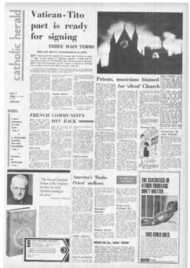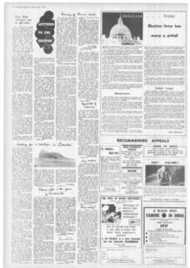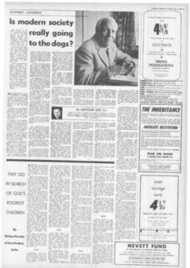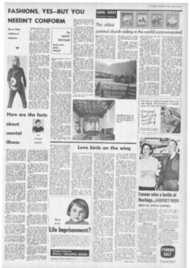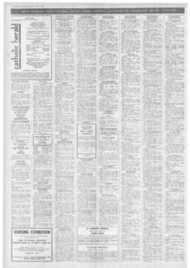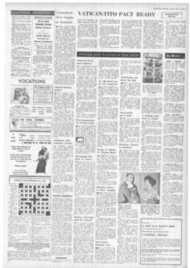Page 4, 3rd June 1966
Page 4
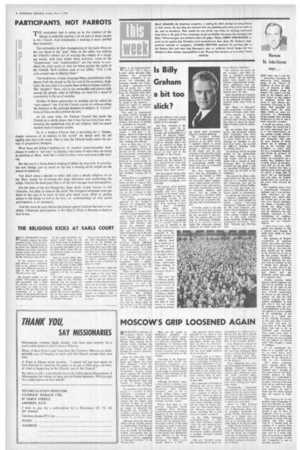
Report an error
Noticed an error on this page?If you've noticed an error in this article please click here to report it.
Tags
Share
Related articles
'if Only We Could Disguise Them All As Billy Graham ......
Check On Dr. Billy's 'converts'
Church Friendly, Says Dr. Graham
Anti-catholics Threaten Dr Graham
Churches In Canada `growing Together'
Is Billy Graham a bit too slick?
,HE's a bit fundamentalist, isn't he?" This is how a London priest describes Billy Graham, the 47-year-old American evangelist. It expresses the somewhat deprecating attitude the Catholic clergy — and many of the laity, no doubt, too — have towards this Baptist minister from the Southern Bible Belt.
No one regards him as a charlatan hot-gospeller, but buried deep in a lot of Catholic minds is the question what's his angle? A question shared by many other Christians and agnostics.
This week he commenced his third London Crusade at Earl's. Court and if Britons find difficulty in accepting his motives, they have no trouble in accepting his sincerity.
He has a compelling and forceful personality which demands — and gets — attention. When he holds up his Bible and quotes passages he does it in a way that sounds new, exciting and relevant.
Even in these days of ecumenism Catholic opinion in this country appears to be only tolerant of Dr. Graham and his mass-media, computerised, public-relations. switched-on evengelism. Across the Atlantic he has many friends in the Church, especially among the Jesuits. But one would be very surprised if Catholics here gave him public backing, like Cardinal Cushing did in Boston.
Among Briton's evangelicals, Dr. Graham's Crusade is already assured of support. The evangelical-learning Church of England newspaper recently reported the results of a survey on the Crusade it had conducted among 160 clergy and 516 laity.
This showed overwhelming approval of Dr. Graham's methods of evangelism and gladness that he was coming to Britain again.
Editorially, it commented : "In Billy Graham himself there must surely be entire confidence; nobody can meet him without being melted by his warmth and sincerity. But among the strongest supporters of Billy Graham himself, one sometimes finds slight hesitation about the role of the organisation of which Billy Graham is a part."
The British Weekly, a Christian journal reflecting Presbyterian, Congregationalist and similar views, in a long editorial concluded: "In Christian communication, power must never over-ride truth or love. Is there a danger that, in the technique of mass evangelism, with a highlyskilled organisation, just this can happen—despite the integrity of the preacher?
"There is a place for every kind of evangelist. God knows we need them all. Sometimes we wonder if Billy Graham. without the mechanics and the organisation, is not the preacher we need most of all in our times."
in March the Archbishop of Canterbury, Dr. Michael Ramsey, wrote officially that the Church of England and the dioceses in the London area had no official share in the invitation to Dr. Graham and "it is well known that there are different views about Dr. Graham's methods and the nature of his message".
But then, referring to the people who might be influenced by Dr. Graham's message and commended to a church, Dr. Ramsey added : "It is important that the clergy of every tradition should be ready to welcome those who may he referred to them in this way, and should help to fulfil their new resolves in the service of God and in the fellowship of the Church.
"Whatever we think of the theology and the methods of mass evangelism we must with thankfulness and love help those whose hearts and consciences have been moved."
But particularly strong criticism appeared in a major frontpage editorial in the inter-denominational fortnightly, New Christian.
This journal, which includes prominent Anglicans, Roman Catholics and Free Church members on its board, wrote: "It is impossible to view the forthcoming crusade to be conducted by Dr. Billy Graham with anything other than grave foreboding. Like many other misguided Christians, Dr. Graham's intentions are good and his sincerity is not in doubt, but the content of his teaching
and the techniques employed in his crusades must in the long run be harmful to the spread of the Christian faith.
"The techniques employed in the crusades are not, of course, significant ly different from those employed in any form of 'soap box' evangelism where the emphasis is on quick returns in the form of a personal response from individuals whose feelings of guilt have been successfully aroused.
"That they fair to influence people who arenot already committed to Church membership is nothing like as serious a matter asthe fact that they encourage clergy and laity in their failure to embark upon the hard think ing which must accompany long-term mission planning .. .
"Dr. Graham's sermons, based on a near-literal interpretation of the Bible, reveal a complete failure to grasp any of the insights which come through a Christian estimate of the world, and the sole intention of the preacher seems to be that of saving individual men and women from the perils of life in a world which is degenerating rapidly and which will soon be consumed in the fires of Hell.
"His firm opposition to those who are attempting to proclaim the Gospel in 20th century terms and who are concerned with a contemporary interpretation of Christian ethics is now well known, and every opportunity is taken to denounce scholars and pastors who are trying to communicate Christian truth in ways which make sense to those who are at present outside the orbit of traditional belief.
"It hardly needs to be said that it is the plain duty of local churches to welcome and care for the casualties of the crusade, but equally plain is the duty to discourage participation in its activities: and to begin the long-term mission operation for which there can
be no effective substitute."
His sermons are based on the scriptures and what he
calls a "personal encounter with Christ". But his drawing
power rests largely on his brilliant organisational ability, drive, enthusiasm and sin cerity. "The secret of my work is God. I would be nothing without him," he says.
Since becoming an evangelist in his twenties he has preached to an estimated 34 million in crusades from New York to Sydney.
His "Hour of Decision" radio programme is heard in
millions of homes every week.
From country to country, city to city, this blond preacher from North Carolina has tried to share his knowledge of Christ with his fellowmen.
He has written four major books, and produced several films. Londoners who don't have the inclination to travel to Earl's Court to hear his
message of salvation in the next four weeks, can see him on BBC-1's Meeting Point on Sunday, June 5.
His message will be directed mainly at the unchurched, who after "deciding to ac cept Christ" will be put in touch with a church of their choosing. But, if previous crusades are any guide, it will be committed Christians, who will make up the bulk of his audiences.
The crusade has been under organisation for the past two years by a 31-member Execu tive Committee here Ied by Major-General Wilson-Haffen den. Its cost has been esti mated at £300,000 and its expected results as tremendous. It will be the first time that a religious evangelistic meet ing has ever been relayed by closed circuit television throughout England and will be the most extensive television relay programme of any
kind • ever produced here.
Cities outside London taking part in this relay include Leeds, Leicester, Southampton, Manchester, Newcastle, Shef field, Norwich and Birmingham.
blog comments powered by Disqus


